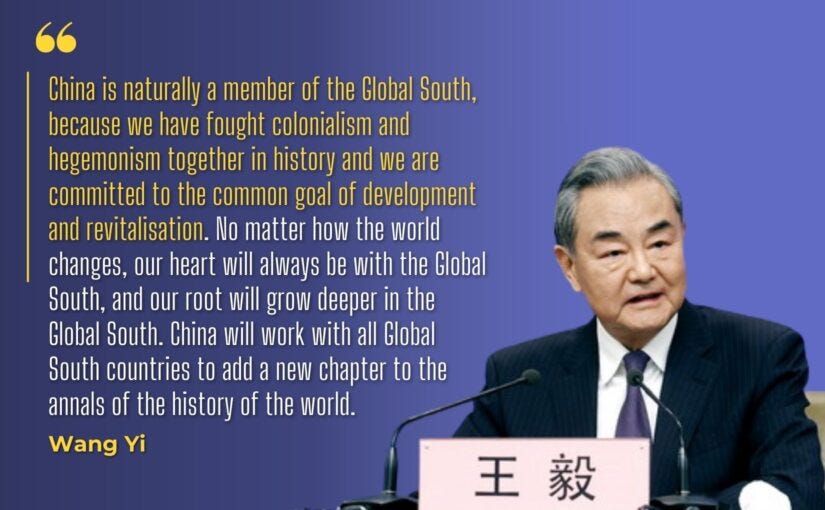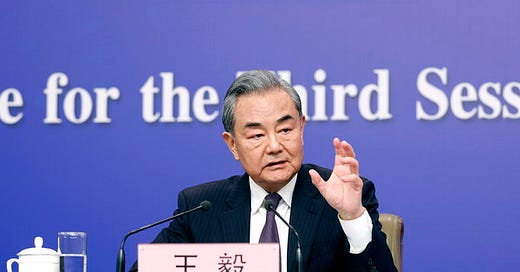Wang speaks on international situation
Chinese Foreign Minister reaffirms China’s commitment to South-South cooperation
Chinese foreign minister Wang Yi declares that the international situation is full of changes, but “the mission of China’s diplomacy remains unchanged.” China will, “along with other countries, continue to uphold what is right, steer the direction of our era, defend international fairness and justice, and safeguard world peace and stability.” Wang made the declarations at the beginning of a ninety-minute press conference for Chinese and international media, held on March 7, 2025, during the annual meeting of the National People’s Congress (NPC). The National People’s Congress is the highest legislative authority in China; it is elected directly and indirectly by the people. Its annual plenary session is typically held in March for a period of ten days. (See “Political Structures in Socialist China: A people’s alternative to Western representative democracy,” October 8, 2021; “China: Democracy That Works: A less conflictive, more consensual system of people’s democracy,” December 21, 2021; and “People’s democracy in China: The false discourse of Chinese authoritarianism,” May 24, 2024).

The Global South is the driving force for world development. Radio Republic Indonesia asked, what can the Global South do to protect its interests as the world becomes more uncertain and turbulent? Foreign Minister Wang Yi declared that dynamic changes in the world are emerging from the growing strength of the Global South and that “the Global South is a key force for maintaining world peace, driving world development, and improving global governance.” BRICS is an important indicator of the growing strength of the Global South. Five countries were added as full members of BRICS on January 1, 2024; and thirteen countries, including Indonesia, became partner countries on January 1, 2025. Wang declared that “BRICS is emerging as a backbone of cooperation and an engine of growth in the Global South.” (See “BRICS+ and the emerging new world order: Toward a just and sustainable world of peace and prosperity,” October 29, 2024).
BRICS should be made bigger and stronger, in order to give more momentum to the development of the Global South, Wang asserted. The Global South should stand in unity, keeping development as its central international agenda. “We should speak in one voice to the world, safeguard our common interests, and steadily increase our representation and voice in global governance.”
Although China is a large country, it remains a developing country, and it shares a common history and common destiny with the nations of the Global South. Wang declared:
China is naturally a member of the Global South, because we have fought colonialism and hegemonism together in history and we are committed to the common goal of development and revitalization. No matter how the world changes, our heart will always be with the Global South, and our root will grow deeper in the Global South. China will work with all Global South countries to add a new chapter to the annals of the history of the world.
China’s technological breakthroughs promote the common development of humanity. Referring to China’s DeepSeek, a representative of CGTN (China) noted that some in the USA find it unacceptable for China to get ahead in technology. She asked the Minister for his views on China-US competition in science and technology. Wang noted that China’s technological innovations have long defied expectations, beginning with atomic bombs, missiles, and satellites decades ago, and more recently with space missions, 5G, quantum computing, and DeepSeek, all achieved despite economic sanctions. Scientific and technological advances, Wang maintained, should never be seen as a reason for building walls; they are the basis for the “common development of humanity.” China has proposed initiatives that “give priority to scientific and technological capacity-building of the Global South so that no country is left behind.”
Chinese vitality in an uncertain world economy. A representative of Dragon TV (China) asked for an assessment of the challenges confronting the Chinese economy, in light of the weakness of the global economy in recent years. Wang noted that the Chinese economy grew 5% last year, even though it has been transitioning to green, in spite of the lackluster growth of the world economy and unilateral economic sanctions by the USA and others. He maintained that the vitality of the Chinese economy is a result of China’s super-sized market and huge domestic demand, its robust industries that emphasize innovation, its institutional strength, and its policy of opening-up to external investors and markets. He maintained that “the Chinese miracle of unprecedented high-speed growth will be followed by even more remarkable high-quality development.” He further observed that the Chinese Foreign Ministry will continue to foster a favorable international environment for Chinese modernization.
China-Russia diplomatic relations are a model for major country relations. A representative of the Russian News Agency ITAR-TASS asked if the recent Russia-US talks would affect Chinese relations with Russia. The Foreign Minister responded that “no matter how the international landscape evolves, the historical logic of China-Russia friendship will not change.” China and Russia are committed to everlasting friendship, comprehensive strategic coordination, and mutually beneficial, win-win cooperation. The relation between China and Russia “is a pioneering effort in forging a new model of major-country relations.” Last year, the seventy-fifth anniversary of the establishment of diplomatic relations between China and Russia, President Xi Jinping and President Vladimir Putin held three face-to-face meetings.
The Shanghai Cooperation Organization (SCO) shows the value of mutually beneficial cooperation, the Prime Minister asserted in response to a question from People’s Daily, the newspaper of the Central Committee of the Communist Party of China. SCO—a Eurasian political, economic, security and defense organization established by China and Russia in 2001—has grown in the last twenty-four years from six to twenty-six countries, becoming the largest regional organization with respect to geographical areas as well as population. “The key to the SCO’s growth lies in its commitment to the Shanghai Spirit, in its adherence to the founding principles of mutual trust, mutual benefit, equality, consultation, respect for diversity of civilizations and pursuit of common development, and in its success in charting a new path for regional cooperation.”


